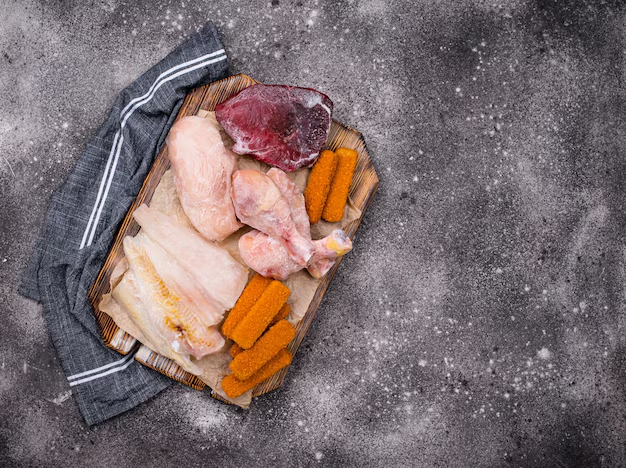How Long Does Chicken Stay Fresh in Your Fridge? A Complete Guide to Maximizing Shelf Life
Opening your refrigerator to find chicken that's been sitting there for a few days, you might wonder if it's still good to cook or if it's time to toss it out. This common dilemma not only involves concerns about food waste but also ensuring the safety and healthiness of your meals. This guide dives into the fascinating topic of how long chicken can last in the refrigerator, offering tips on how to store it properly and what signs to look for when determining its freshness.
🕒 The Shelf Life of Chicken in the Refrigerator
The freshness of chicken, like many raw meats, depends on proper storage conditions. Uncooked chicken generally lasts 1 to 2 days in the fridge. Cooked chicken, on the other hand, can safely stay in your refrigerator for about 3 to 4 days. These timelines provide a general guideline for best quality and safety, reducing the risk of bacterial growth.
Raw vs. Cooked: What’s the Difference?
- Raw Chicken: The exposure to bacteria such as Salmonella and Campylobacter is a concern with raw chicken. This is why the timeframe for keeping raw chicken is shorter.
- Cooked Chicken: Cooking meat kills bacteria, thus extending its shelf life. However, once cooked, chicken should be properly stored in airtight containers to maximize freshness.
🥶 Proper Storage Tips for Maximum Freshness
1. Temperature Matters
Maintaining a refrigerator temperature below 40°F (4°C) is crucial in extending the life of your chicken. An accurate thermometer can help ensure your fridge is at the optimal temperature.
2. Use Airtight Containers
When storing chicken, both raw and cooked, use airtight containers. This not only keeps the chicken fresh but also prevents cross-contamination with other foods in the fridge.
3. Utilize Freezer for Longer Storage
If you plan not to use the chicken within the advised timeframe, freezing it is a fantastic option. Chicken stored in the freezer can last for several months without losing quality. Raw chicken can be frozen for about 9 months, while cooked chicken can last for 2 to 6 months.
🧐 How to Tell If Chicken Has Gone Bad
Recognizing the signs of spoiled chicken is critical to avoid consuming something that might make you ill. Here are several indicators:
Visual Cues
- Discoloration: Fresh chicken is pale pink. If the color has turned gray or greenish, it's gone bad.
- Slimy Texture: A sticky or slimy surface film indicates spoilage.
Smell Test
If the chicken emits a sour or ammonia-like odor, it is no longer safe to consume.
Expiration Date
Always note the "sell-by" or "use-by" date as a guide for freshness. However, once opened, depend on sensory checks to confirm quality.
🏆 Quick Reference Cheat Sheet
🌡️ Refrigerator Temperature: 40°F (4°C) or lower
📅 Raw Chicken: 1-2 days
📆 Cooked Chicken: 3-4 days
🚫 Signs of Spoilage: Discoloration, bad smell, slimy texture
❄️ Freezing: Raw chicken - 9 months; Cooked chicken - 2-6 months
🤔 Frequently Asked Questions
Q: Can I extend the life of my chicken through marinating?
Yes! Marinating chicken can act as a barrier and help preserve its freshness. However, the same fridge storage durations still apply.
Q: What about storing chicken at room temperature?
Chicken should never be left out at room temperature as bacteria can rapidly multiply. If left out for over 2 hours, it's best to discard it.
Q: How accurate are the smell and texture tests?
While these tests are beneficial, they aren't 100% reliable. It's imperative to follow storage guidelines closely to prevent spoilage.
Navigating Common Myths
Myth 1: Washing Chicken Removes Bacteria
Washing chicken does not kill bacteria; it spreads it around your sink and countertops. Cooking to the right internal temperature is a safer method to ensure harmful bacteria are eliminated.
Myth 2: Spoiled Chicken Always Smells Bad
Not all spoiled chicken emits a strong odor. It's essential to check for multiple spoilage signs before deciding to cook it.
Efficient Meal Planning to Reduce Waste
🗓️ Plan Your Meals
Consider using meal planning apps or a simple list to schedule what you will cook each week. This will help purchase the right amount of chicken and minimize waste.
🍽️ Use Leftovers Smartly
Utilizing cooked chicken in salads, sandwiches, or stir-fries can help finish leftovers promptly. Look for recipes that make the most of cooked chicken.
Preparing for Unexpected Events
Being ready with preservation techniques can make a big difference. Keep these practices in mind:
- Vacuum Sealing: Vacuum-sealing raw chicken before freezing helps extend its life significantly by reducing oxygen exposure.
- Label and Date: Always mark the freezing date on baggies or containers to keep track of when each item was stored.
A Final Word on Food Safety
Maintaining the right knowledge about how to store and handle chicken ensures that you and your family remain safe from foodborne illnesses. By understanding storage guidelines and recognizing spoilage signs, you can enjoy your meals with peace of mind.
Chicken is a staple in many households, and knowing how to maximize its shelf life is an invaluable skill. Keep this guide handy for your next grocery shopping or meal prep session, and enjoy fresher, safer meals every time. 🌟

